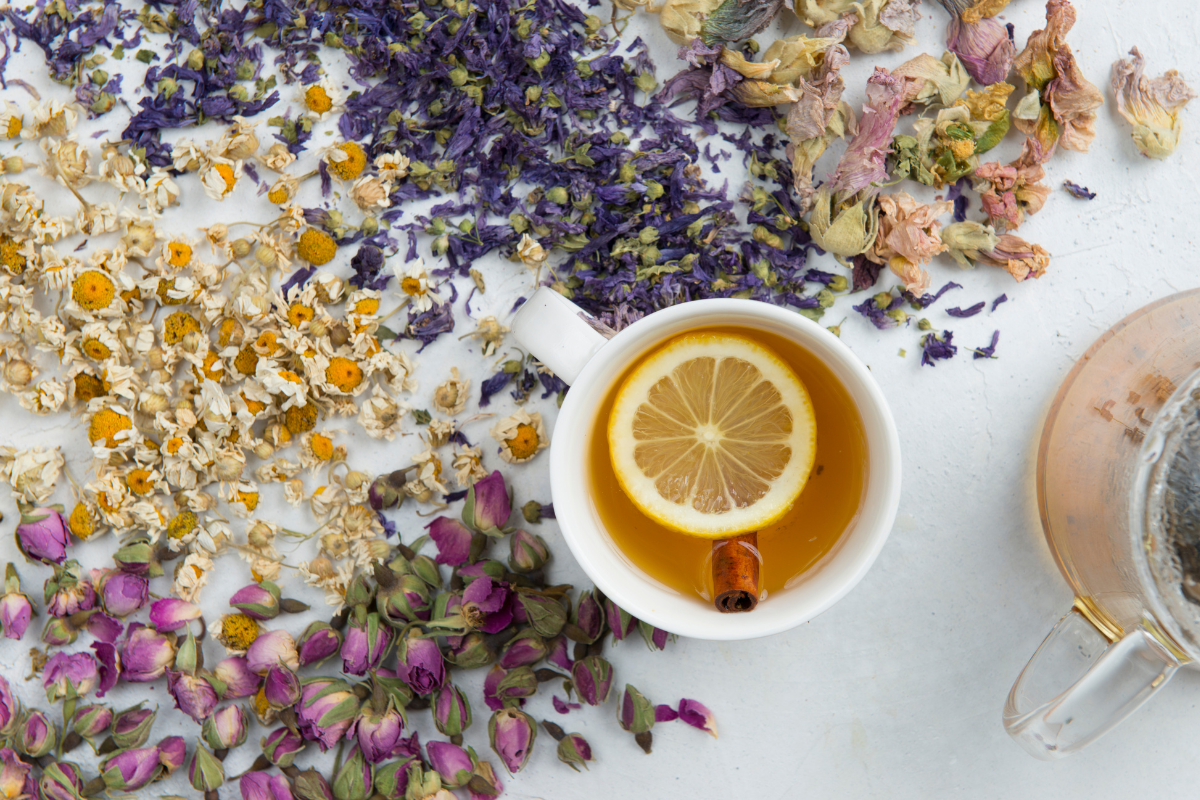Long before energy drinks lined grocery store shelves and adaptogenic lattes became Instagram-worthy, herbal tea benefits were commonly known and seamlessly integrated into people's daily lives, quietly supporting their wellness. While the modern functional beverage market races to create the next breakthrough drink, herbal teas (also known as tisanes when they contain no tea leaves) have been delivering targeted health benefits for thousands of years—making them the original functional beverage that today's $149.75 billion industry is still trying to perfect.
The Functional Beverage Market: Built on Established Foundations
The global functional beverage market is projected to reach $248.51 billion by 2030 with a compound annual growth rate of 8.9%. This explosive growth reflects consumers' increasing demand for drinks that do more than just quench thirst; they want beverages that support specific health goals.
But here's what many don't realise: herbal teas were the original functional beverages, delivering targeted wellness benefits centuries before the term "functional beverage" was coined. From the tea ceremonies of East Asia to the medicinal brews of the Mediterranean, from the healing tisanes of South America to the therapeutic infusions across Europe and Africa, cultures worldwide understood that the right combination of herbs could support everything from digestion to immune function to stress management.

Why Herbal Tea Benefits Align with Modern Functional Beverage Trends
Today's fastest-growing functional beverage trends mirror what herbal teas have always offered:
Clean-Label Transparency
Modern consumers scrutinize ingredient lists, demanding transparency and recognizable components. Herbal teas naturally align with this trend, featuring whole herbs, flowers, roots, and botanicals you can actually pronounce and understand.
Plant-Based Wellness Solutions
The plant-based movement extends beyond food into beverages, with consumers seeking natural alternatives to synthetic supplements. Herbal teas deliver plant-based compounds like polyphenols, adaptogens, and beneficial polysaccharides in their most bioavailable forms.
Caffeine-Free With Functional Benefits
While many functional beverages rely on caffeine for their "functional" effect, caffeine-free functional beverages like herbal tisanes provide sustained wellness benefits without the crash. This makes them ideal for all-day consumption and evening wellness routines.
Sugar-Free Yet Flavorful
The benefits of herbal tea for daily health don't require added sugars or artificial sweeteners. Natural compounds in herbs provide both flavor complexity and functional benefits, creating functional beverages without sugar that still taste exceptional.
Understanding Tisanes: The Purest Form of Herbal Tea Benefits
While "herbal tea" remains the commonly searched term, the more precise designation is "tisane,” the French word for herbal infusions that contain no actual tea leaves from the Camellia sinensis plant. This distinction matters because tisanes offer several advantages over traditional tea-based beverages:
Whole Ingredient Advantage: Premium tisanes use whole herbs, flowers, roots, and botanicals rather than crushed leaves or powders. This preserves the full spectrum of beneficial compounds and allows for optimal extraction of polysaccharides, polyphenols, and other active constituents.
Multiple Steeping Benefits: Because tisanes contain whole ingredients, they can be steeped multiple times without losing potency. In fact, some beneficial compounds are released more fully in second and third steepings, maximizing the functional benefits from each sachet.
Pure Plant Medicine: Without tea leaves, tisanes avoid any caffeine content while delivering concentrated plant compounds. This makes them true caffeine-free functional beverages that can be enjoyed throughout the day without disrupting sleep patterns.
The Research Behind Herbal Tea's Traditional Uses
Modern research explores what traditional healers have long understood about herbal tea benefits:
Gut Health Research Studies: suggest that compounds in herbs like goji berries may influence beneficial bacteria populations and butyrate levels in laboratory settings. Research on ingredients like astragalus and cordyceps indicates their polysaccharides may interact with microbiota in animal models.
Stress Response Studies: Herbs like astragalus, codonopsis, and cordyceps have been studied for their potential adaptogenic properties in research settings. Some studies suggest these herbs may influence stress-related pathways, though more human research is needed. This makes them popular choices for natural drinks for wellness routines.
Traditional Detoxification Uses: Traditional "heat-clearing" herbs like chrysanthemum and honeysuckle have been used historically to support the body's natural processes. These herbs are valued in traditional systems for their role in supporting liver and lymphatic function.
Hormone System (Endocrine System) Research: Some studies suggest compounds in herbs like licorice root may influence cortisol pathways, whilst research on cordyceps explores its potential effects on hormone production in laboratory settings.

Beyond Individual Uses: The Traditional Combination Approach
What distinguishes herbal teas in traditional practice is the combination of multiple botanicals. Whilst modern functional drinks often focus on isolated compounds, traditional herbal formulations combine ingredients believed to work together synergistically.
In Traditional Chinese Medicine (TCM), the art of herbal formulation extends far beyond simply combining beneficial ingredients. It requires precise understanding of how each botanical interacts with others and in what specific proportions to achieve maximum therapeutic effect.
TCM practitioners have spent millennia perfecting these ratios, recognizing that the same herb can serve different functions depending on its quantity relative to other ingredients in the blend. A formula might use astragalus as the primary "emperor" herb in larger quantities for immune support, while including smaller amounts of supporting "minister" and "assistant" herbs like codonopsis or licorice root to enhance absorption and minimize any potential side effects. This sophisticated understanding of synergistic relationships is why qìsane collaborates directly with qualified TCM practitioners to ensure each sachet contains the exact grammage of every ingredient needed for optimal wellness benefits. Unlike mass-market herbal teas that use arbitrary amounts of herbs primarily for flavor, every qìsane blend reflects centuries of refined knowledge about how specific proportions unlock the full therapeutic potential of each botanical combination, delivering the precise functional benefits that traditional medicine has long promised.
The Premium Positioning of Modern Herbal Functional Beverages
Today's discerning consumers understand that healthy drinks for wellness require quality sourcing and expert formulation. Premium herbal tea brands are elevating the category by:
-
Collaborating with traditional medicine practitioners to ensure authentic formulations
-
Sourcing at times rare, high quality herbs from specialized growers
-
Using biodegradable, plastic-free packaging that aligns with environmental values
-
Providing transparent information about ingredient origins and processing methods
Making Tisanes Part of Your Daily Wellness Routine
The beauty of tisanes as functional beverages lies in their versatility and gentle effectiveness. Unlike energy drinks or pre-workout formulas designed for specific moments, the benefits of herbal tea for daily health make them ideal for consistent, long-term wellness support.
Consider incorporating different tisane blends throughout your day:
-
Morning energizing blends with cordyceps and astragalus for sustained vitality
-
Afternoon digestive support with hawthorn and osmanthus after meals
-
Evening calming blends with chrysanthemum and jujube for better sleep quality
The Future of Functional Beverages Is Time-Tested Wisdom
As the functional beverage market continues its rapid growth, expect to see more brands turning to traditional herbal formulations for inspiration. The challenge lies in maintaining the integrity and synergistic benefits of traditional combinations whilst meeting modern standards for quality, convenience, and taste.
The most successful brands in this space will be those that honour the established wisdom behind herbal tea benefits whilst presenting them in formats that fit contemporary lifestyles such as premium tisane sachets that deliver the convenience of modern functional beverages with the time-tested efficacy of traditional herbal medicine.
Tisanes aren't just riding the functional beverage trend, they are the established founders of the category all across the world. As consumers become increasingly sophisticated about wellness and ingredient quality, the original functional beverage is reclaiming its rightful place at the forefront of the health and wellness movement.
Looking to explore premium functional tisanes? Discover expertly crafted blends that combine traditional Chinese Medicine wisdom with modern convenience, created in collaboration with qualified TCM practitioners and made from the highest quality herbs.
DISCLAIMER: The content, imagery, documentation, and information available on this website and qìsane's social media platforms are intended solely for general informational purposes. They are not designed to diagnose, treat, cure, or prevent any medical conditions, nor should they be used for therapeutic purposes or as a substitute for professional medical advice. These statements have not been evaluated by the Food and Drug Administration.
If you have any specific medical concerns or are undergoing medication, it is crucial that you consult with a registered healthcare professional before consuming any tisanes. We are not responsible for any loss, harm, or damage, whether physical, financial, or emotional, that may result from the use of information or products discussed herein.


